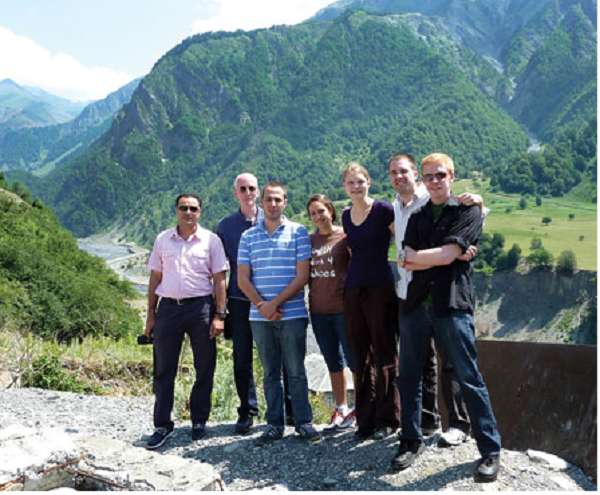‘Visions of Azerbaijan’ invited them for a mid-term weekend in the newly developed resort in Qabala, north Azerbaijan; there we sipped tea and talked about their experiences; the backdrop - tree-covered foothills in the Great Caucasus Mountains.
What are your general impressions about Azerbaijan – the places you have visited and the people you have met?
Kelsey: The hospitality we were told about before we came turned out to be true. We’re staying with Azerbaijani families – being overfed, in a hospitable manner! And learning how to respond to that. As for our travels in Baku and the regions – we’ve been to Sheki and Qabala. Baku is such a nice city...
Jack: Geographically, I was impressed by how diverse everything is; I was expecting more of an arid climate throughout the country, but I’ve seen a lot of variety. I’ve also seen a lot of variety in the people here – I haven’t seen a specific Azerbaijani look, you can see that there’s been a lot of influence from different ethnic groups over time.
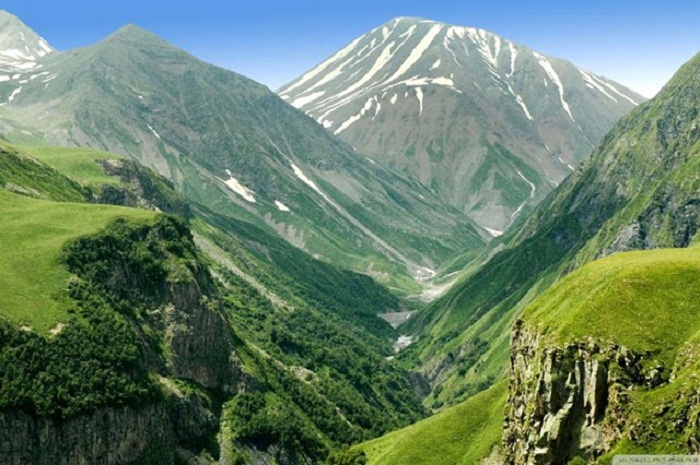
Tony: Along with what Kelsey said, the hospitality has been fantastic. I’ve had two different host families; they’ve both been very kind and very interested in my background – they want to know me as a person, not just as an unknown guest – they really want to get to know me and they want to tell me about themselves, their family and their culture, which is one of the better aspects of the trip - learning about the culture as well as the language.
Stephen: I’d say, going along with the hospitality, the Azerbaijanis have a very strong sense of pride, in that they want to make you very comfortable, they don’t want to push you and I think that they want you to like them for who they really are. I don’t think that they are pretentious whatsoever. They are very honest about who they are and are very proud of who they are.
Jeiran: Well, for someone who’s been here before, what I was most surprised by was, in the five years I have not been here, how much Baku has completely changed. You can really see the western influence. When I left they were just starting to build those big buildings, and now I’ve come back and everything is really beautiful, with these big huge buildings and it’s amazing what has happened in just five years.
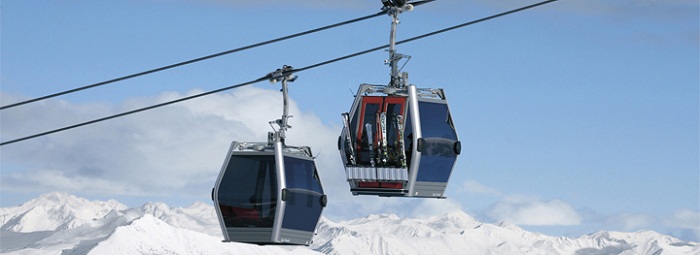
Could you tell us about the culture, history, politics and others?
Jeiran: We went to a mosque in Sheki – that was one of the first mosques I’ve been too, especially abroad – and I knew Islam was a man’s world, but I was just surprised how much of a man’s world it was. The women had to go in through a separate door and we had to cover our faces, and Kelsey had to even cover her shoulders. I’ve been here before and still have family here – that was one of the big things I noticed.
Kelsey: Obviously we’ve been learning the language, which has been amazing. I expected it to be much more difficult to absorb, but it’s going well. Going along with Islam – we’re all living with host families and my host family is fairly religious, and I’ve been talking with them about it, and my host’s sister, who is 25, told me that she was the first one to start performing namaz (prayer, performed 5 times daily – ed.) When she was 17 she saw a neighbour praying and wanted to learn more about it and started doing it herself. It’s a really interesting generational break between her parents, who lived during the Soviet Union and her, being able to get back in touch with her culture – how important that’s been, and how she brought her parents into it, too.
Jack: I was surprised by what a specific masculine culture there is in Azerbaijan. I was expecting a little more mixing of the genders in terms of genders, in terms of what people talk about together, what they do together, what men and women’s roles are. For me that’s been a bit of an adjustment, and interesting to witness.
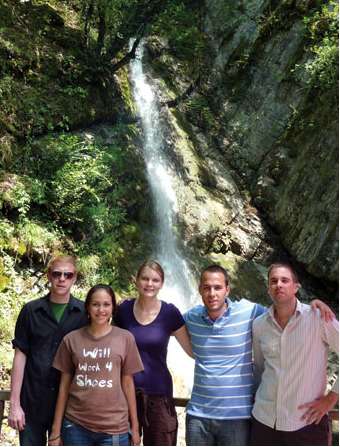
Tony: It’s tough for me to itemise what I’ve learned, because I came in with a blank slate. I’ve studied Soviet politics and Russian-Georgian relations and, although it’s a neighbour of Georgia, I’d never really learned much about Azerbaijan – I didn’t know who Heydar Aliyev, or Ilham Aliyev, was before I came in, so I just came in with a completely blank slate, so it’s been quite a learning experience. I really like the small cultural stuff – like my host family told me that if you take the bubbles of your tea and rub them on your head, that’s good luck and means you’ll get money in the future. In all the countries I’ve been to, I like learning the little cultural tidbits that you see in a household, but you don’t see in public.
Stephen: Also, outside the house, it might be a man’s world, but inside the house it’s certainly “Mother knows best”. For us Americans, we meet a number of intersections with traditions in Azeri culture and, maybe superstitions might come across as a little negative, but some traditions like, for example drinking cold water, is something that they think is very bad for your health. And the culture of eating more, and if you don’t want more, that’s disrespectful to the cook, so getting used to that is certainly different at a cultural level.
How will you use your experience in your future life?
Jeiran: Since my father is from Azerbaijan, one of my goals is to learn both Azerbaijani and Russian better, but to learn the culture, I want to keep it in my life. Most Americans have never heard of Azerbaijan – they really have no idea where Azerbaijan is, so I think it’s important to keep it in my life. And I’m a musician, so I’m very interested in mugham, which is also not advertised very well in the United States – I want to come back and stay here for a few years, learn the music and the language much better than I do now.... and advertise it more back there.
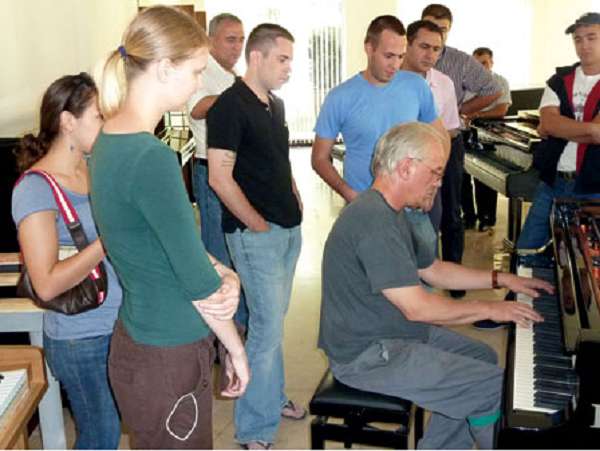
Kelsey: Well, I don’t intend to leave after this programme ends – I’m going to stay here, because it’s hard to get the Azerbaijani language in the States, there are maybe 3 universities that have it, so I’m going to stay here to continue working on my language skills and use that to apply to history PhD programmes so that I can do research into Azerbaijani history. I intend this to be the beginning of a very long relationship with this country and I intend to continue to come back throughout my life for research and because it’s a lovely country.
Jack: Well, firstly, this is relevant to my thesis and secondly, once I’ve done with my master’s programme I plan on applying to law school – I’d like to do international trade law.... I’m certain that I’m going to continue to come to Azerbaijan and spend time here; hopefully do business here, work here. But I think things will unfold with time and I’ll have a more specific idea what to do.
Tony: I planned my master’s to branch out more from Georgia to the entire Caucasus – security in the region. I’ve never studied the Karabagh conflict before, but I plan to include that in my thesis, but also my original goal was to start an NGO that deals with helping civilians after conflict – the women, the children and men who aren’t involved in the actual firing of rifles. I want to help the civilians that are affected by it. That could definitely be used here, with the refugees and the people affected. That’s my goal, and that could definitely be used here.
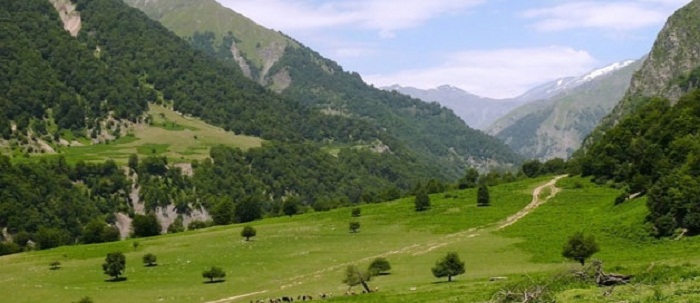
Stephen: Similar to Jeiran, I am interested in raising Azerbaijan’s profile in the United States. Currently, I’m writing a blog – well, a few of us are writing blogs – focusing on cultural aspects of Azerbaijan. All 6 of us sitting here know how important Azerbaijan is politically, commercially and culturally, but people back home have difficulty knowing what this country is, so spreading information about what this country is and why it’s important is one of my objectives on this programme. It’s been very helpful in extending the way I think about foreign languages.
How can Azerbaijan achieve the further recognition of its history, culture and business in a global world?
Kelsey: I think forging more relationships with the US and also European universities to bring more students here. The way most students in America get to know about other cultures is through study abroad. This CLS (Critical Language Scholarship) programme is really one of the only ones that get Americans here for extended periods. Supporting closer relations with universities to get more students involved and getting more Azerbaijani students to go abroad - and Azerbaijani musicians and artists.
Jeiran: Organise more things like this - send more students here. I think they do need to rely on people who do come here to spread the word and take musicians there. In Madison, Wisconsin, one of the schools that teach Azerbaijani, they had a guy come and perform mugham and a lot of non-Azeri, non-Turkic people showed up.
Stephen: Something I found interesting about Kelsey and Jeiran’s point about cultural exchange... The Prince of Liechtenstein – a wealthy man – had a very big art collection. He donated it to the Metropolitan Art Museum in New York City. There were giant banners outside the museum saying ‘Liechtenstein’. That was a stunt in history that went very well in raising a country’s profile, increasing foreign investment. Azerbaijan is certainly very well endowed with history and culture. Raising the cultural profile among the cultural intelligentsia in New York was something that Liechtenstein was able to accomplish and it would be very interesting to see if other countries approach that.
Tony: I think word of mouth is the best way. You see the group of students here; we’re all pretty dedicated, we had to make these efforts to come to Azerbaijan. So I think word of mouth –telling 10 and 2 might say yes. Just keep telling people. The percentages aren’t great, but the more you keep telling people, the more you’ll get through to them.
Jack: I would say tourism. That would be the easiest possible way for Azerbaijan to increase cultural exchanges. Make it known to Europeans, Americans and Canadians that this is a hospitable place to visit, a hospitable place to do business. Resorts are fine – amusement parks etc. – but the everyday things, the cultural things. Yesterday, being able to go to a piano factory and a juice factory. Anything like that, if it’s local and accessible, is just naturally interesting to people who want to come and visit the country. So it’s nice to have western luxuries, but also to have what’s culturally specific to Azerbaijan - the excavations, for example, we don’t have that. Having that available and accessible to tourists and to potential business people would, I think, be really good for this country.
Were you surprised by Qabala?
Jeiran: Yes. Especially because I live with my aunt and uncle, and I said to my uncle, “Oh, you know, I’m going to Qabala” and they asked me, “Why would you be going there?” The last time they had been here was about 4 years ago and they said “There’s nothing there, just this cute little town” and so when I came here and there are these 2 beautiful resort hotels and they’ve been constructed in only 2 years, it was just quite unexpected.
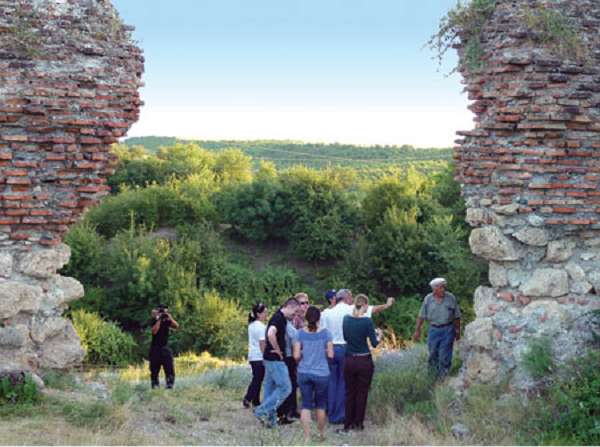
Kelsey: Yes, I had no idea what to expect coming here. I knew about the piano factory, but I didn’t imagine we’d be able to go to it. I only knew about it because I’d read about it in ‘Visions of Azerbaijan’. And I knew that there was a music festival that was happening in a few weeks. But I had no idea what we’d be doing here and to come to a tiny town in the Caucasus and go to a piano factory, a juice factory and an archaeological excavation and do all these things – it was just a remarkably varied number of activities that you can do in Qabala. And when you think about that, in a small town like this – it’s remarkable how diverse our day was yesterday.








